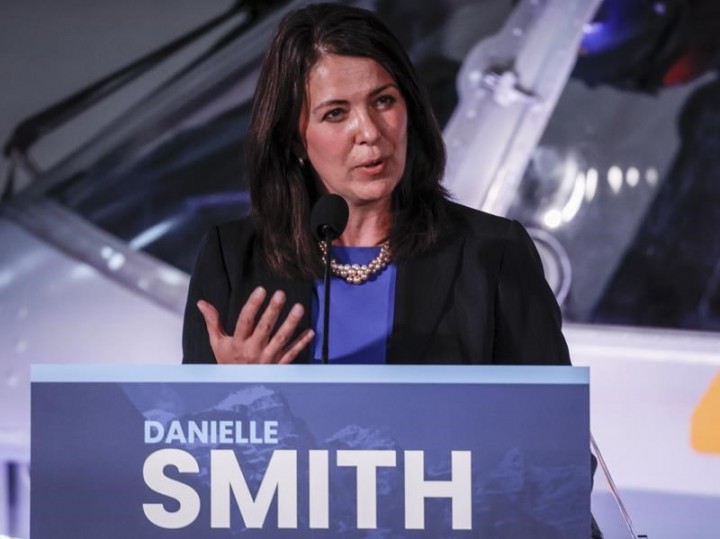Alberta Premier Danielle Smith says she didn’t mean to trivialize prejudice faced by minority communities when she suggested unvaccinated people have experienced the most discrimination she has ever seen in her lifetime.
Smith’s comment on her first day as premier drew criticism from across Canada — including British Columbia Premier John Horgan, who called it “laughable,” and at least one Jewish group who says it reached out to her office to express concern.
Smith said in a statement Wednesday that she intended to underline the mistreatment of individuals who chose not to be vaccinated.
“I want to be clear that I did not intend to trivialize in any way the discrimination faced by minority communities and other persecuted groups or create any false equivalencies to the terrible historical discrimination and persecution suffered by so many minority groups,” said the statement.
Smith was sworn in Tuesday as Alberta’s new premier after the United Conservative Party elected her in a leadership race to replace Jason Kenney as leader and premier.
Later in the day, at her first news conference as premier, Smith said she would shake up the top tier of the health system within three months and amend provincial human rights law to protect those who choose not to get vaccinated for diseases including COVID-19.
“(The unvaccinated) have been the most discriminated-against group that I’ve ever witnessed in my lifetime,” said the 51-year-old.
“I don’t think I’ve ever experienced a situation in my lifetime where a person was fired from their job or not allowed to watch their kids play hockey or not allowed to go visit a loved one in long-term care or hospital, not allowed to get on a plane to either go across the country to see family or even travel across the border.”
Horgan, who is to step down as B.C.’s NDP premier later this year, responded to Smith’s comment Wednesday in an interview with C-FAX Radio in Victoria.
“It’s laughable, quite frankly,” Horgan when asked about Smith’s comment by radio host Al Ferraby.
Horgan said the global community has just gone through an unprecedented time with the COVID-19 pandemic — “nothing like this in over a hundred years going back to Spanish influenza.”
“On top of that, we have a toxic drug supply that is killing our friends and our neighbours. At the same time, we are running out of people to provide the services,” Horgan said.
“For the incoming premier to focus on a sliver of the population who chose not to get vaccinated when there are all these other challenges seems short-sighted to me. And I just disagree with her. I believe the vast majority of Canadians understood we had a collective responsibility.”
Alberta Health data shows more than 82 percent of the province’s total population has received the first dose of the COVID-19 vaccine and nearly 78 percent of the population has two doses.
Duane Bratt, a political scientist at Mount Royal University in Calgary, said Smith’s comment would be laughable if she weren’t the premier.
“This shows what drove her campaign and who her supporters are,” he said.
Bratt said Smith’s comment is offensive because there has been a lot of discrimination in the past 50-plus years.
“We still had forced sterilization. We had residential schools up until the 1990s,” he said. “We didn’t have gay marriage until (2005).”
Bratt said race, religion, sexual orientation and disabilities are not choices.
“Those are things that you have and that’s why we don’t allow discrimination based on that,” he said. “Deciding not to be vaccinated is a choice that people make.”
Some local groups and mayors also expressed concerns about Smith’s comments.
“We have reached out to the premier’s office to express our concerns surrounding these comments and are keen on meeting with the premier to discuss antisemitism, discrimination in our community and others in Alberta, the need for mandatory Holocaust education, and the story of Alberta’s Jewish community,” wrote Jewish Edmonton.
Calgary Mayor Jyoti Gondek said on Twitter that there’s a lot she could say.
“I choose to focus on demonstrating to this premier the work that our city continues to do around anti-racism, Indigenous relations, Holocaust remembrance, allyship with the LGBTQ2S+ community and equity-based awareness,” she wrote. “In other words, work that matters.”
This report by The Canadian Press was first published on Oct. 12, 2022.
